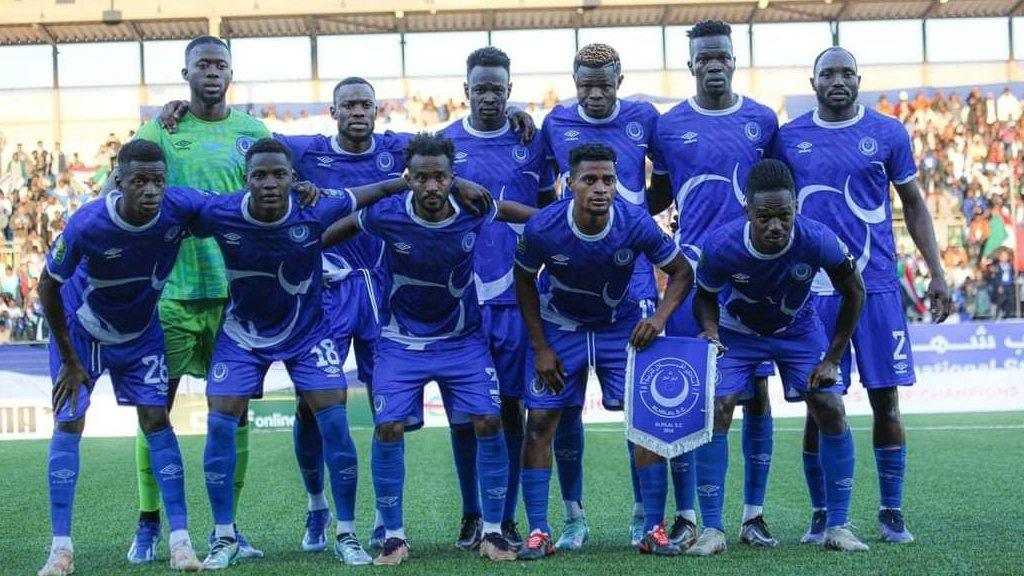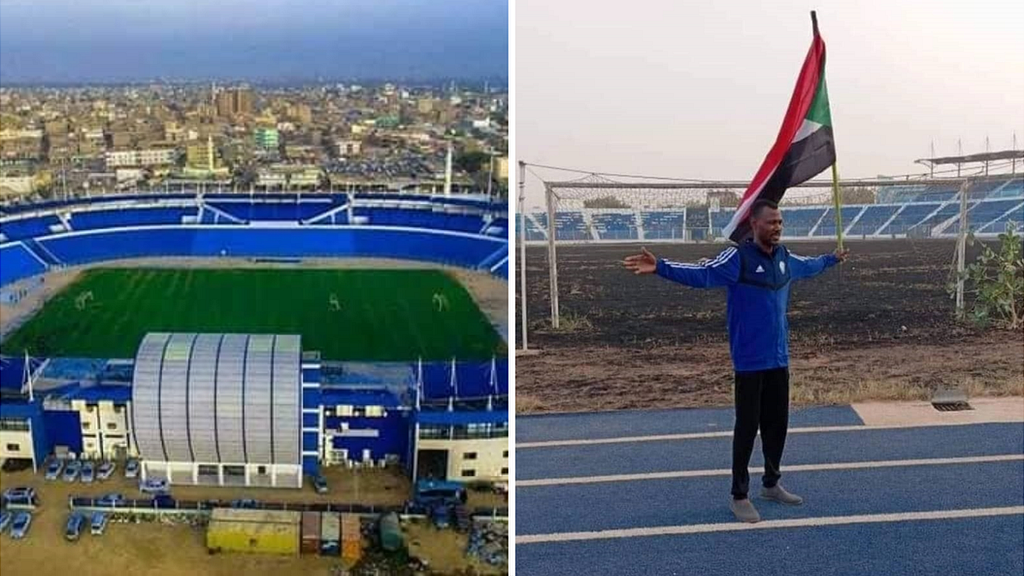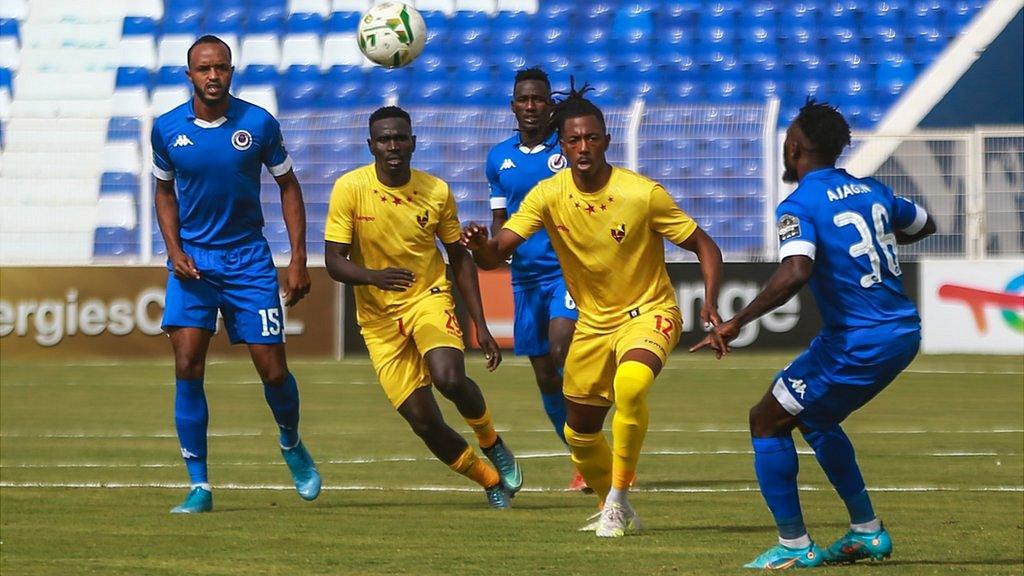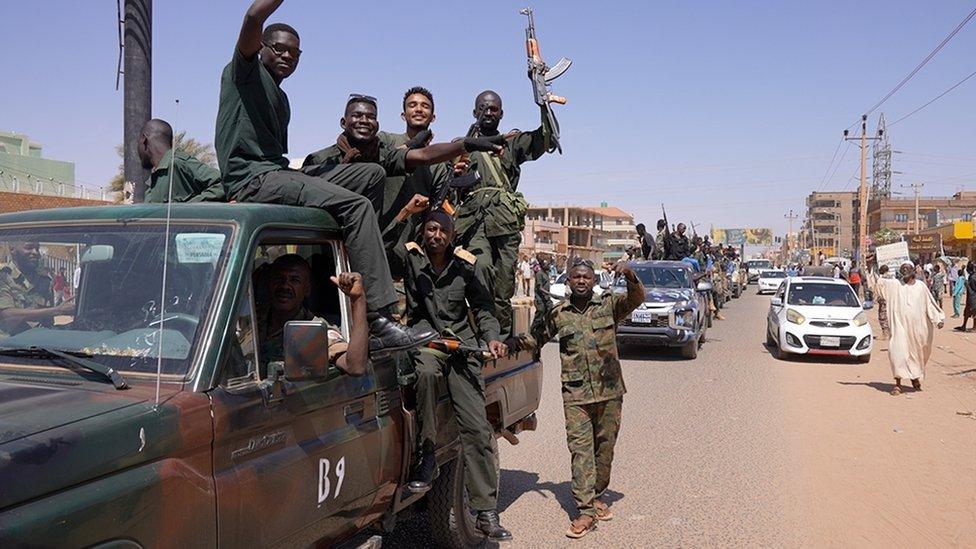Al Hilal: Sudanese champions play on 'to distract people from war'
- Published

Al Hilal played all their African Champions League group games this season at the Benjamin Mkapa Stadium in Tanzania
Almost a year since civil war broke out in Sudan, the country's most successful football club Al Hilal say they keep playing to offer "a distraction" to people back home.
The conflict has killed over 14,000 people, forced eight million to flee their homes and the United Nations has warned it could trigger the world's largest hunger crisis.
The domestic league has been halted but the Sudanese champions have found a way to continue their activity on the pitch by entering into an agreement with the Tanzanian Football Federation (TFF) to play in the country's top flight from August.
"We are playing during this very sad moment to distract our people from the war," Dr Hassan Ali, Al Hilal's secretary general, told BBC Sport Africa.
"The majority of football fans in Sudan sometimes don't have anything, even during normal times. What they have is victories of Al Hilal, which make them happy with their families.
"It is a moral responsibility. It is not playing for winning points and cups. No, we play for our fans to keep their morale high."
A club which is almost a century old, and African Champions League regulars, made requests to several other federations across the continent and had received positive responses from Uganda and Libya before settling on a deal with Tanzania.
"We have preferred Tanzania because football there is very progressive and competitive, and we would like to be well prepared for the next competition at African level," Dr Ali added.
Familiarity with Tanzania was also a consideration for Al Hilal as the East African country was the club's base during this season's Champions League campaign, which ended in group-stage elimination.
TFF spokesperson Clifford Mario Ndimbo told the BBC that all clubs in the league support Al Hilal's inclusion, but their matches will count as friendly games.
"They [Al Hilal] will be on the schedule, but their results will not be included in NBC Premier League results," Ndimbo said.
"The goal is to help them when the country is in disaster, but also we believe this move will bring positive results as the league will be followed from different places. That will increase popularity and help to increase income for the clubs."
Playing in Tanzania could also help Al Hilal avoid a mass exodus of players before their participation in next season's continental competition.
The Omdurman-based club currently has about 10 foreign players on their roster.
"I think it will help Al Hilal to hold on to their players and Florent Ibenge, a coach who is known around the continent and a major part of what they're trying to do," Abdul Musa, an analyst on Sudanese football, explained to BBC Sport Africa.
"They need some sort of competition where they can have readiness to compete continentally. If you're not playing in a league, it's difficult."
Exiled by war

Al Hilal's stadium, once one of the best in the country, is now in a state of disrepair after almost a year of civil war
Al Hilal's decision to base themselves abroad is a reality which many Sudanese have faced, having been forced to leave their homes since the civil war broke out last April.
"War has always a negative impact," Dr Ali said.
"We are in exile and players have been playing in a very difficult situation - a state of war - away from their families.
"At administrative level we cannot meet physically. Members of the board of directors are scattered in different parts of the world.
"At a financial level, we have lost a lot of resources including the revenues from African competition. But we are determined to continue despite the war, hoping that one day we'll come back to our stadium and our fans."
When professional football will return to Sudan remains uncertain, with military factions still battling for control of the country.
But even should the war stop now, Al Hilal will be unable to use their state-of-the-art stadium which was renovated in 2018.
The club say it will cost about £3.2m ($4m) to repair damage to their home ground in Omdurman, labelled the 'Blue Jewel', which has been looted.
"Before the war we imported new equipment for modern lighting. All this equipment imported from Spain has been stolen," Dr Ali lamented.
"The grass needs rehabilitation. Our offices, all these things, have been seriously damaged."
Out of business

Al Hilal and Omdurman-based rivals Al Merreikh met in the African Champions League in 2022
Sudan's oldest club Al Merreikh are also looking for a new home.
The club got positive replies from Tanzania, Libya, Uganda, Kenya and Ghana but BBC Sport Africa understands they will be settling for Tanzania like their rivals Al Hilal.
While the two biggest clubs in the country have the means to move away from the conflict and continue playing, most of the football clubs in Sudan have been forced to let players go since the league was halted.
"About 15 other clubs are out of business completely," Musa said.
"They're not able to maintain paying wages. With no income it's been a very tough situation, so a lot of players are now free."
As a consequence, many players are seeking opportunities elsewhere.
One country which has seen an influx of Sudanese players is Libya - whose league resumed in 2021 after being suspended during its own civil war, which lasted six years.
"The Libyan Football Federation allowed each club to sign two Sudanese players and consider them as Libyan nationals on their system so they don't take up foreign players basis," Musa, who has also worked as an agent for some Sudanese players, explains.
"They're not signing two- or three-year contracts, they're not signing with large signing-on fees.
"It's basically three or four months, and it's just salaries really - something to get by if they have any debt and to help their family for the next few months."
Moving abroad 'the only solution'
John Mano is one of the players who made the move to Libya, joining Al Sadaqa on loan from Al Hilal.
While the salaries in North Africa are lower than what Sudanese players earned at home, the forward is keen to keep active despite the psychological distress of trying to focus on his career when his family's security is not guaranteed back home.
"Any player who is in Libya will go to training or a match and end his day watching the news about Sudan," Mano told BBC Sport Africa.
"Players need psychological comfort in order to be creative. There is some support but we must be here so our families can eat.
"We are not earning the same as in Sudan but this is the only solution. We have the opportunity to market ourselves and get back into football as we were in Sudan."
For now, those in Sudan seek to survive the war.
When the guns finally go silent, Musa believes the recovery of domestic football will take time.
"The war has set us a long way back," he said.
"A lot of players have left, so teams will need to recruit once again for them to be able to compete.
"A lot of work is going to be needed but the main thing, obviously, is for the war to stop."
Additional reporting by Morad Dkeel.

Sudan army soldiers retook territory in Omdurman, where Al Hilal are based, but mortars still fall daily in the area